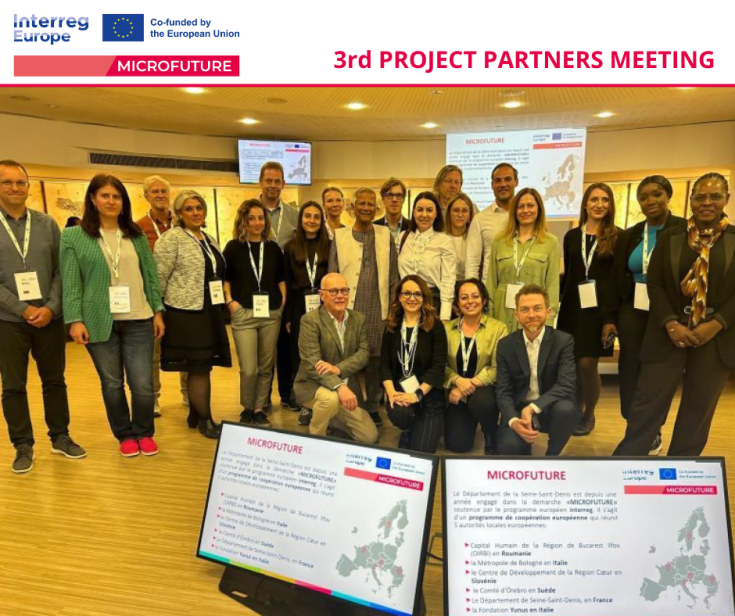MUHAMMAD YUNUS ADVOCATES FOR SOCIAL CHANGE AT THE CONFERENCE
On May 16th, Microfuture project partners had the honor of meeting Nobel Prize winner and Grameen Bank founder, Muhammad Yunus, during our conference in Seine-Saint-Denis. For 50 years, Yunus has provided loans to vulnerable communities, inspiring the creation of the MICROFUTURE initiative. His pioneering work in microfinance continues to empower marginalized groups and drive social change, which is also our project's main aim.
The MICROFUTURE project, financed by the European Interreg program, recently held its third interregional partners' meeting in Seine-Saint-Denis on May 16 and 17. This initiative brings together local authorities from Romania, Italy, Slovenia, Sweden, France, and the Yunus Foundation Italy as advisatory partner. The primary goal is to enhance the capabilities of local authorities in microfinance and solidarity finance, addressing the needs of their territories while fostering the social economy.
A highlight of the first day was the attendance of professor Muhammad Yunus, the Nobel Prize winner and founder of the first microcredit institution in Bangladesh in 1974. Yunus, a pioneering figure in microfinance, shared his insights and proposed solutions to contemporary challenges such as economic recovery, social inclusion and ecological and digital transitions.
The seminar, held in the Department of Seine-Saint-Denis, showcased a range of social and solidarity initiatives to MICROFUTURE project partners. It featured a conference that brought together numerous stakeholders, including Adie, Crésus, Yunus France, Crédit Coopératif, France Active Métropole, SCIC Label Gamelle, CIGALES, Banque de France, and BNP. These entities highlighted their actions in microfinance and solidarity finance, focusing on professional inclusion of micro-entrepreneurs, the use of digital technology for economic inclusion of vulnerable populations, inclusive mobility, ecological transition, and financing solutions for vulnerable groups.
Professor Yunus's participation underscored the importance of innovative approaches in addressing current socio-economic issues. His extensive experience in microfinance, particularly through the Grameen Bank model, provided a significant learning opportunity for all attendees. He emphasized the role of microfinance in empowering marginalized communities, citing examples of successful micro-entrepreneurs who have benefited from these initiatives.
The transnational meeting continued with field visits to various local projects, including the "Le Relais" integration restaurant, the Pointcarré Cooperative School Boutique, and Novaedia’s Ferme des Possibles. These visits allowed European partners to witness firsthand the inspiring solidarity initiatives in the region, showcasing how local projects can significantly contribute to social and economic inclusion.
The first day of the event also featured presentations from the Yunus Foundation, offering a comprehensive analysis of the challenges faced by microfinance initiatives in different regions. The insights provided through gap analysis and partner questionnaires highlighted the importance of collaborative efforts in overcoming these challenges and implementing innovative policy solutions.
As the meeting concluded, partners left with a renewed sense of purpose and determination to continue their collaborative efforts. The commitment to empowering communities and promoting sustainable development through microfinance was evident, with partners dedicated to applying the best practices discussed during the event

